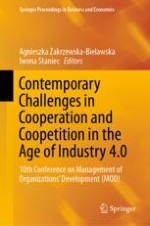
2020 | OriginalPaper | Buchkapitel
1. Barriers of Creating Competitive Advantage in the Age of Industry 4.0: Conclusions from International Experience
verfasst von : Anna Adamik, Michał Nowicki
Erschienen in: Contemporary Challenges in Cooperation and Coopetition in the Age of Industry 4.0
Aktivieren Sie unsere intelligente Suche, um passende Fachinhalte oder Patente zu finden.
Wählen Sie Textabschnitte aus um mit Künstlicher Intelligenz passenden Patente zu finden. powered by
Markieren Sie Textabschnitte, um KI-gestützt weitere passende Inhalte zu finden. powered by